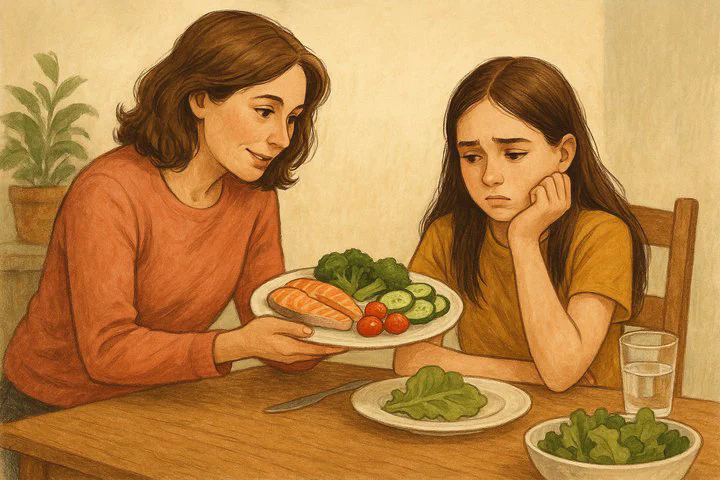Worries About Stepdaughter's Eating Habits

Understanding and Addressing Your Worries About Stepdaughter’s Eating Habits
If you’re a stepparent feeling worries about stepdaughter’s eating habits, you are not alone. Many families struggle with strong food fears, very limited food lists, and the risk of eating disorders. This guide explains what may be happening, shows warning signs, and offers simple steps you can take—at home and with professional help—to support your stepdaughter.
Understanding Extreme Picky Eating
What It Looks Like
Most kids turn down foods now and then, but extreme picky eating is different. Your stepdaughter might accept only a short list of “safe” foods and feel upset if anything new appears. Family meals can turn into standoffs instead of quality time.
Why It Happens
Taste and texture can be part of the story, yet deeper feelings—like past choking scares, big changes at home, or anxiety—can add to the struggle. When these concerns grow, very limited eating can start evolving into an eating disorder if nobody steps in early.
Remember, you did nothing wrong. Your caring questions show love, not blame. The next sections will help turn your worries about stepdaughter’s eating habits into a clear, gentle plan.
Signs a Picky Phase Is Evolving into an Eating Disorder
Red Flags to Watch
• Ongoing weight loss or slowed growth
• Skipping whole meals or hiding food
• Talking a lot about calories or “being fat”
• Anger or panic when foods touch
• Repeated panic attacks regarding food
Emotional Clues
Sad mood, tiredness, pulling away from friends, or wearing baggy clothes can all hint at deeper trouble. If she refuses to talk about it, keep listening without pushing.
Seeing several of these signs means your worries about stepdaughter’s eating habits are valid. Write down what you notice and share it with the other parent or a trusted doctor right away.
Dealing with Panic Attacks Regarding Food
In the Moment
During a panic surge—fast breathing, tears, or shaking—focus on calm, not calories. Speak softly: “You’re safe. Let’s breathe together.” Count slow inhales and long exhales or offer a comforting object.
Building a Safer Table
Serve trusted foods next to tiny tastes of new items, with no pressure to eat. Keep talk kind—no jokes about weight or “clean plates.” Praise small wins, like touching or smelling new food. Over time, these gentle steps can loosen the tight grip of picky habits and lower the chance of another panic attack regarding food.
If panic returns often, a counselor trained in anxiety or eating issues can teach coping tools. Invite your stepdaughter to help pick this helper. Even if she refuses to talk about it now, let her know help is always there and that asking for support shows strength.
Encouraging Open Communication
Opening the Door
Choose calm times away from meals—walking the dog, coloring, or riding in the car. Start with, “I’ve noticed eating feels hard for you. I care and want to understand.” Use a gentle tone and relaxed body language.
Listening Skills
Use “I” statements: “I feel worried when you skip dinner because I want you to feel strong.” Ask short, open questions like, “What foods feel okay right now?” Respect silence; thinking takes time.
Keeping Trust
Praise any sharing, even one-word answers. Offer choices: “Would you rather write me a note or talk tomorrow?” Step by step, you’ll turn walls into bridges and ease your worries about stepdaughter’s eating habits.
When to Seek Professional Help
Knowing It’s Time
Call in experts if she keeps losing weight, eats fewer and fewer foods, faints, has steady stomach pain, or talks about wanting to be “skinny at any cost.” Early help can stop bigger problems.
Who Can Help
• Pediatrician (family doctor) – checks growth and health
• Food expert (dietitian) – simple ways to add nutrition
• Child therapist – teaches coping skills and handles fears
Ask the doctor for a recommendation to a trusted therapist or food expert. Explain to your stepdaughter: “A helper can give us tools we don’t have yet.” Give her simple choices, like picking a question to ask the helper.
Before the visit, jot down foods she avoids, times panic hits, and mood changes. These notes save time and paint a clear picture for the professional team.
Quick Resource Ideas
• Printable calm-breathing chart for kids
• Short videos on tasting new foods
• Directory of child eating-disorder specialists
(Visuals like these can make the steps above even easier to follow.)
Key Takeaways
In summary, if you have worries about stepdaughter’s eating habits, remember you’re not alone:
- Spot the difference between normal picky eating and signs that things are evolving into an eating disorder.
- Stay calm during panic attacks regarding food and keep meals low-pressure.
- Build trust, even when she refuses to talk about it.
- Seek professional help early; it can make all the difference.
With patience, love, and the right support, your family can move from stress at the table to a healthier, happier relationship with food—and with each other.